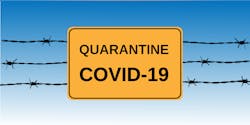QIAGEN to launch rapid test that can analyze over 30 samples per hour for SARS-CoV-2 antigen
QIAGEN has announced plans to launch a rapid portable test that can detect SARS-CoV-2 antigens in people with active infections in less than 15 minutes and process, on average, around 30 swab samples per hour using a small digital detection system, according to a press release.
The Access Anti-SARS-CoV-2 Antigen Test, which is expected to become available in the fourth quarter of 2020, is designed for environments that require a high volume of fast and accurate test results. The portable test offers a new combination of speed and scale that marks a step towards decentralized mass testing that health authorities all over the world have been urgently seeking.
The Access Anti-SARS-CoV-2 Antigen Test extends the partnership with Ellume, an Australian digital diagnostics company. It is the second QIAGEN COVID-19 test to make use of Ellume’s digital eHub and eStick system. In August, QIAGEN announced the Access Anti-SARS-CoV-2 Antibody Test that uses the same devices.
Two versions of the Antigen Test are scheduled for U.S. launch in the fourth quarter – one for labs and one for point-of-care (POC) use. QIAGEN will apply for the U.S. Food & Drug Administration (FDA) Emergency Use Authorization (EUA) and seek CE-IVD registration in Europe. A CLIA Waiver in the U.S. would allow the POC version to be used in settings like airports or stadiums.
Feasibility tests have shown the Access Antigen Test to have a sensitivity of at least 90 percent and a specificity of 100 percent.
“The Access Antigen Test is fast, easy to use and cost-effective and will be a valuable tool to address the so far unmet high-volume testing needs for SARS-CoV-2 antigens in situations where time is of the essence,” said Thierry Bernard, Chief Executive Officer of QIAGEN. “It will deliver highly accurate results and will complement the gold-standard PCR tests used for detection of active COVID-19 infection. PCR tests offer a high level of diagnostic accuracy but are time-consuming and lab-bound.”

